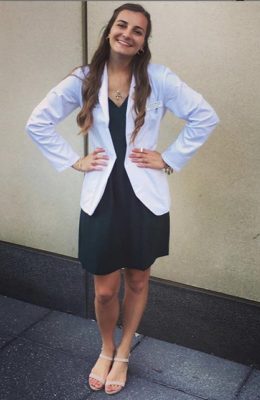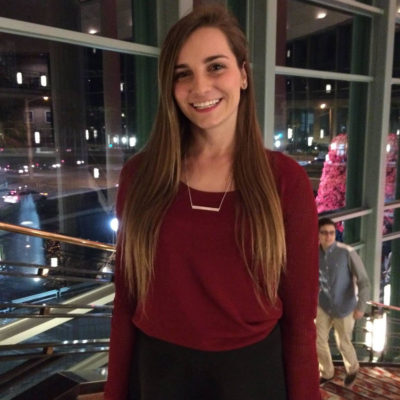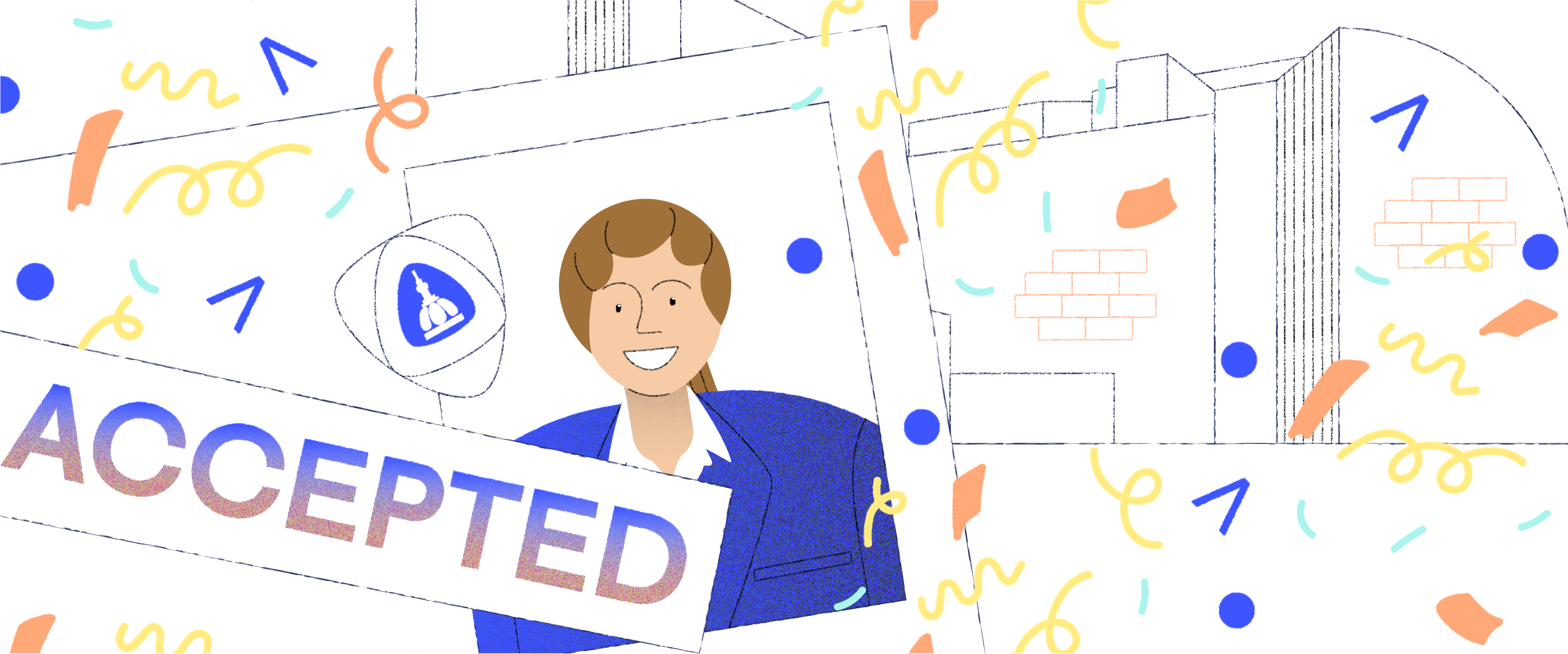How I Got Accepted to George Washington University School of Medicine
This is just one of a series of blog posts that will feature medical students telling their stories of how they got accepted into medical school. Today, Marissa shares with us her story of how she got accepted to the George Washington University School of Medicine.
Marissa, give us a peek into your life. What initially attracted you to pursue medicine?
I believe that your story changes as you go through different points in your medical education. The earliest memory I have of wanting to be a doctor is from when I was five years old. My mom was a pharmacist, and she brought me to the Mayo Clinic, and I saw cancer cells growing. This sparked my interest in medicine.
The reasons why I wanted to be a doctor changed as I got older, and I volunteered with the Kids Cancer Foundation, and I really saw the effects that these doctors are having on these kids and patients.
More recently, my grandma passed away in the hospital of unknown diseases, and it came to a point when I said: “I don’t want doctors like this, I want doctors that will be able to empathize with the patient, work with them, and treat them as a whole–not just as a part.”
That was a pivotal moment for me, and my motivation has evolved even more in med school because of GWU’s emphasis on public health. We host a lot of summits where we learn about public health issues, such as pediatric asthma, obesity, and other public health problems.
Prior to medical school, I didn’t realize the issues in regards to public health and how underserved communities are treated in regards to medicine, or lack of treatment, I should say. So, that is something that I want to be involved with in my future medical career.
I want doctors that will be able to empathize with the patient, work with them, and treat them as a whole–not just as a part.
Why did you major in Philosophy?
I was actually pre-med in high school. I went to a college prep school where I took all the classes: biology, forensic science, physical exam. You name it, I took it. I went to college thinking that I would be a biology major, and then I took my first ethics class, and I loved it.
I thought: “This is amazing. I know that my life is going to be medicine, so let me just spend four years doing something different, such as humanities.” I enjoyed it so much, and I think that it contributed to a lot of the skills and characteristics that I have and others don’t because they only studied science in college.

Why did you choose to apply to GWU Medical School?
I applied to medical school my sophomore spring and I got in, so I didn’t have to take the MCAT. It was part of a joint program where I did four years of undergrad at GW and four years of medical school at GW. It worked out really well because GW offers everything that I would want in a medical school since it is in a city, and I get exposure to so many things because of its location.
I often tell prospective students that if you are interested in anything under the sun or even a combination of things, there is somebody in the D.C. area, most likely at GW, that has the same interest. That gives you the opportunity to work with them in any capacity–whether it’s research or just mentorship–and it is so helpful to have somebody that has already been down the path you want to pursue.
What are the three reasons why you think you were accepted?
My path is very different from the normal interview process. I did not have a student interviewer; I only had a professor interview me. I remember that her name was Dr. Werling, and her specialty was Neuroscience. Honestly, the whole interview was a conversation, but I remember that I was really nervous about it.
I think the reasons I got into GW were that: 1) I was a humanities major, 2) I was an athlete, and 3) they could tell through the past ten years that I have been on the path for medicine. This specific program will only grant admissions to people that they know want to be doctors and are going to follow through on this commitment.
How do you think the Atlantis Fellowship influenced or impacted your acceptance?
I did the Atlantis Fellowship after my acceptance to medical school. For my specific program, we needed to get a specific number of hours of patient contact, and I was never able to do a semester abroad because of softball, so I decided to do a summer abroad through Atlantis.
Also, I had to technically apply to medical school during my senior year, even though I was already accepted. On my application my Atlantis Fellowship was really important, because I was able to accumulate a lot of hours on my six-week fellowship. GW saw that I continued to accrue patient contact hours throughout my college career. On top of that, we did volunteering with some of the physicians in the hospital.
My biggest takeaway from my Atlantis Fellowship was learning about the difference in the healthcare system in the U.S. and Spain. It is something that you don’t really recognize because we are in the U.S. and it is all we know. In Spain, I had the opportunity to see how physicians approach medical problems through more of a holistic and patient-centered point of view, which the U.S. is trying a little bit more to adopt a similar approach.
How did you feel when you left the interview?
I think my interview was really great because the only question she asked me the whole time was, “Can you tell me about yourself?” It was just a conversation, and I made sure to mention the things that I knew she would need to know in order for me to be there, so I think it is important to not be this cookie-cutter person.
I am currently a student interviewer, and it is obvious if someone is just trying to go into medicine because their mom or dad is a physician and that is all they have ever known, rather than someone with personal experiences that will motivate them to continue on their path. It is really important because you need to cling to your own motivations for why you want to be a doctor.
Med school is really, really hard, and you need a reason to get through it. Some reasons won’t get you through, while others will. You need to make sure that the interviewer understands your passion and motivation for pursuing medical school, and why you want to do it is really important.
Tell me about the moment that you were accepted.
I remember I was shadowing a cardiologist at home in Florida. He had just told me that I was done for the day, and I opened up my email and saw a message from GW med school that said, “Congratulations, you have been accepted.” I was ecstatic because my whole life has been medicine, and so I told the cardiologist, I called my grandma and my mom. I just realized that everything that I had done for so many years had finally paid off, which was really amazing.
Last question: How can others imitate your success?
It is important to have your own path, which doesn’t look the same for everybody. It is important because you read all these blogs that say: research, shadow, study in biology, and all of these cookie-cutter things. Of course, there are requirements that schools need to see, but if you have an interest in music, arts, or the humanities — major in it.
A lot of times, schools think that is better than a science major, because they know that you are going to do all of the pre-med reqs, but they want you to understand how to be a human being. If you have to take a gap year, that is okay too.
If you have an interest in music, arts, or the humanities — major in it.
The ages of students in my medical school class range from students like myself, 23 and right out of undergraduate, to people who are married at 30 with two kids. There is a wide array of backgrounds and interests, so never think you are enclosed by the stereotype of what a doctor is.
About Marissa

Originally from Wellington, Florida, Marissa Mangini graduated from George Washington University in Washington, D.C. with a B.A. in philosophy and a double minor in chemistry and biology. She is now currently in her third year of medical school at The George Washington School of Medicine and Health Sciences. Marissa went to Zaragoza, Spain on an Atlantis Fellowship. Her long-term goal is to be a primary care physician working in underserved communities. In addition, she wants to go into academic medicine or medical education to work with future medical professionals.

